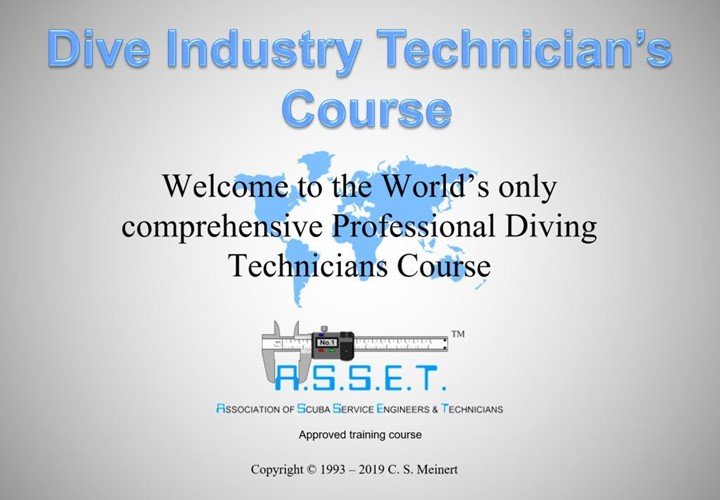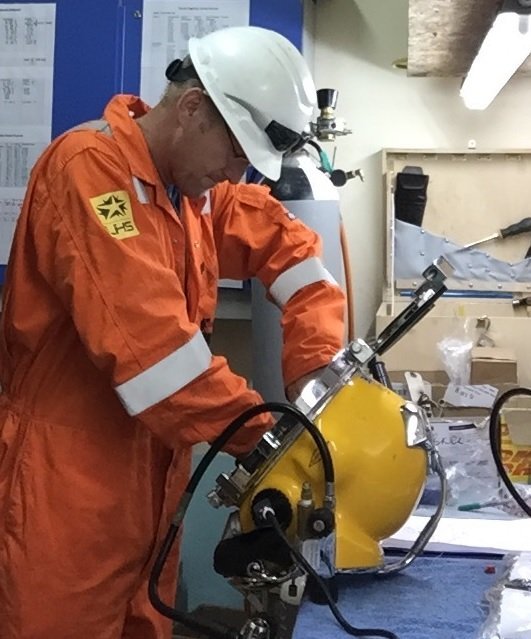Your Path to Success Starts Here: Dive Industry Technicians Course

Dive Industry Technicians Course

‘Dive Industry Technicians Course. highly practical course, with hands-on experience in a real cylinder testing workshop. The Must have course for the diving professional’
The ASSET Dive Industry Technicians Course is a comprehensive training program designed for individuals seeking to enhance their technical skills in the diving industry. This course covers essential topics such as equipment maintenance, repair techniques, and safety protocols, ensuring participants are well-equipped to handle various diving apparatus. With a blend of theoretical knowledge and practical application, students will gain valuable insights into industry standards and best practices, preparing them for a successful career in diving technology. Enroll now to elevate your expertise and contribute to the safety and efficiency of diving operations.
- Course Fees €1700
- Course Dates (January – March 2025)
- Syllabus
- Course duration: 10 days
- Academic development: 4 days (Online or Classroom)
- Workshop experience: 6 days
Course Overview
This 10-day Dive Industry Technicians Course is designed for individuals seeking to gain in-depth knowledge and practical skills related to the service, repair, and operation of diving equipment and related technologies. The course comprises 9 structured modules that emphasize hands-on learning, alongside theoretical instruction. Successful completion of the course will certify participants as qualified dive industry technicians.
Course Objectives
By the end of the course, participants will be able to:
- Understand and apply workshop safety protocols.
- Diagnose and service various diving equipment effectively.
- Operate compressors and manage air quality in compliance with industry standards.
- Set up and maintain a professional workshop environment.
- Adhere to warranties and customer care standards.
- Understand relevant regulations and standards pertaining to underwater operations and equipment.
Module Breakdown
Day 1: Introduction & Workshop Safety
- Overview of the Dive Industry Technicians Course
- Course objectives and expectations
- Introduction to handouts and the Dive Industry Technicians Handbook
- Workshop Safety Protocols
- Personal protective equipment (PPE)
- Tool safety and maintenance
- Emergency procedures and first aid
Day 2: Physics of Diving-Related Plant and Equipment
- Fundamentals of Diving Physics
- Pressure and buoyancy principles
- Gas laws applicable to diving
- Dive equipment mechanics
- Overview of Dive Equipment
- Types of diving equipment and their functions
Day 3: Regulator Service and Repair
- Understanding Regulators
- Different types of regulators (single stage, two-stage)
- Components and functioning of a regulator
- Hands-On Practice
- Disassembly and assembly of regulators
- Maintenance procedures and trouble-shooting techniques
Day 4: Equipment Theory – Design and Construction
- Diving Equipment Design Principles
- Materials used in diving equipment
- Ergonomics and efficiency in design
- Hands-On Work
- Comparative analysis of different equipment designs
Day 5: Compressor and Air Banks – Operation and Air Quality
- Introduction to Compressors
- Types of compressors used in diving
- Operating principles and maintenance
- Air Quality Standards
- Importance of air quality in diving
- Testing and monitoring air quality
- Hands-On Practice
- Operating a compressor
- Conducting air quality tests
Day 6: Setting Up a Professional Workshop
- Workshop Layout and Design
- Essentials of a well-organized workshop
- Tools and equipment inventory
- Professional Practices
- Time management and project scheduling
- Record-keeping and documentation
Day 7: Working Practices, Standards, and Procedures
- Industry Standards Overview
- Certifications and standards relevant to the dive industry
- Best practices for service and repair
- Hands-On Application
- Case studies and real-world scenario debriefs
Day 8: Warranties and Customer Care
- Understanding Warranties
- Types of warranties and their implications
- Handling warranty claims and repairs
- Customer Care
- Importance of customer service in the dive industry
- Communication skills and complaint resolution
Day 9: Regulations and Standards
- Key Regulations Affecting the Dive Industry
- National and international dive safety regulations
- Compliance and inspection processes
- Workshop Compliance
- Ensuring that workshop practices meet regulatory standards
Day 10: Cylinder Testing
- Cylinder Design and Maintenance
- Types of cylinders and their uses
- Importance of regular testing and certification
- Hands-On Testing
- Procedures for testing diving cylinders
- Understanding testing results and reporting
Assessment and Certification
- Practical Exam: Participants will demonstrate their skills in servicing and repairing dive equipment.
- Written Exam: Participants will complete a written assessment covering theoretical aspects of the course.
- Certification: Successful participants will receive certification from ASSET, SITA, and IDEST.
Resources
- Dive Industry Technicians Handbook (provided)
- Access to workshop tools and equipment
- Supplementary reading materials and online resources (As an ASSET Member)
Additional Notes
- Participants should bring/wear appropriate workshop coveralls.
- Bring personal diving equipment for practical sessions (if applicable).
- Refreshments will be provided daily.
This comprehensive syllabus ensures participants receive a balanced education in theory and practice, preparing them for a successful career in the dive industry.
Dive Industry Technicians Course is a highly practical course, with hands-on experience in a real technical workshop. The course is led by an instructor with 30 years of offshore engineering and scuba repair experience.
The dive industry technicians course materials is fully illustrated with high-quality detailed pictures. The DITC manual is included in the course, this is your encyclopedia of examples cutaway pieces of equipment, available for students to view throughout the course. This course is an ideal way for you as a Divers Life Support Equipment Technician, to gain the only Nationally recognized qualification IN SERVICE AND REPAIR OF DIVING EQUIPMENT and become a qualified, highly sought-after professional Technician.
PADI Instructors – This course is recognized by PADI for Equipment Specialist Instructor rating – fulfill PADI’s requirements & submit your certificate of training to PADI.
This is the only course that is approved by the 3 major standards and representative bodies in the industry:
- ASSET – Association of Scuba Service Engineers & Technicians
- IDEST – Inspectorate for Diving Equipment Servicing and Testing
- SITA – UK Scuba Industries Trade Association
In addition, the British Health and Safety Executive has stated that they consider dive industry technicians course to be a core training program for their diving inspectors.
Key Benefits of the Dive Industry Technician Training Course (DITC)
- Provide a thorough background in Dive Equipment repair for the technician.
- includes ASSET Cylinder Visual Inspection Course CPL1 (2 days)
- includes Compressed Air Systems management (compressor operator) Course CASM (2 days)
- Scuba Dive Centres always needs someone to repair the Scuba equipment used in the dive centre. Formal training & experience of scuba equipment repair can greatly assist the dive professional in finding work within a competitive commercial & recreational dive industry recruiting markets.
COURSE FEE INCLUDES:
- ONSITE TRAINING ACADEMIC AND WORKSHOP PRACTICE
- CERTIFICATION-CARD
NOTES
- Students who have completed the online training course and passed online final exams at the required pass grade.
- Are considered to have met the academic requirements for their chosen practical training course.Can chose to attend workshop training (if required) within one year of the online classwork course completion date. Can chose to complete the academic topics covered in the online course again, in a formal classroom teaching environment.
- Are required to have their own personal copy of the student training course materials in printed format.
What Will I Learn?
- The Dive Industry Technicians Course is a comprehensive training program designed for individuals seeking to enhance their technical skills in the diving industry. This course covers essential topics such as equipment maintenance, repair techniques, and safety protocols, ensuring participants are well-equipped to handle various diving apparatus. With a blend of theoretical knowledge and practical application, students will gain valuable insights into industry standards and best practices, preparing them for a successful career in diving technology. Enrol now to elevate your expertise and contribute to the safety and efficiency of diving operations.
About the instructor
12 Courses
4 students
Great course. Love the practical side of the training. Planning on joining another course soon!


